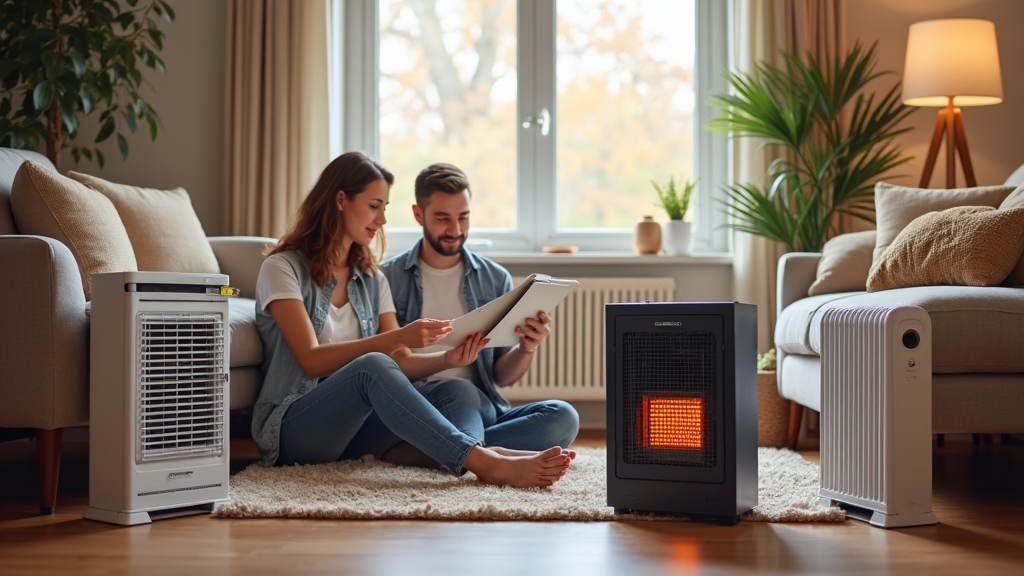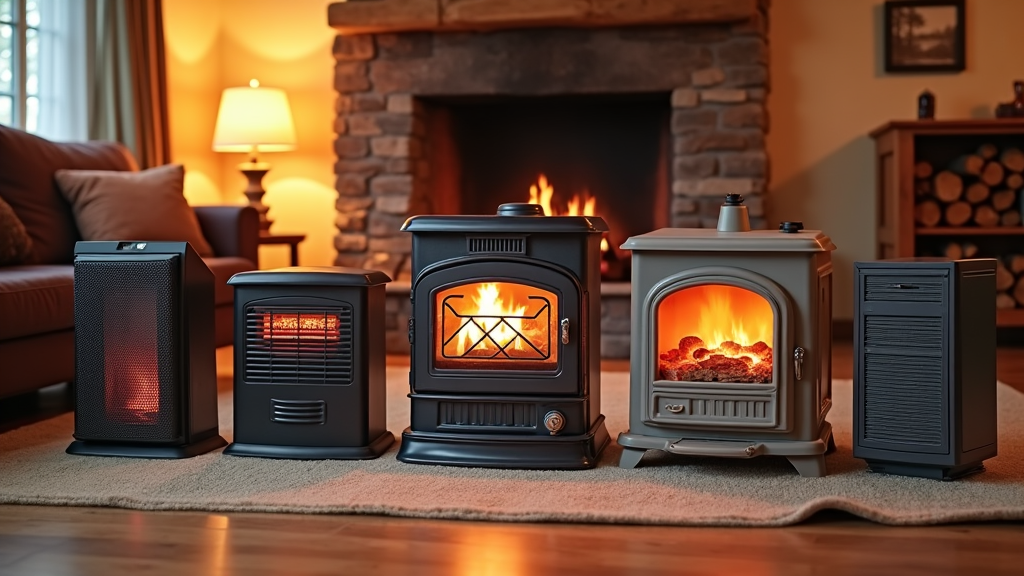Choosing the right heater for your home is crucial. It can keep you warm during chilly Fort Worth, Texas winters and save you money on energy bills. When shopping for a heater, consider factors like the size of the heater, type, energy efficiency, and your specific heating requirements. Also, think about climate considerations and how they affect your heating solutions.
Key Takeaways
- Size matters: Choose the right size for your space.
- Types of heaters: Know the different kinds, like electric, gas, and wood.
- Energy efficiency: Look for Energy Star ratings to save on bills.
- Safety features: Check for timers and automatic shut-off options.
- Local climate: Fort Worth can get cold; ensure your heater meets local needs.
For a comprehensive guide on maintaining your heating system, make sure to check out our heating maintenance.
Understanding Your Heating Needs

Every home is different. Think about how well your current heater works. Is it too hot or too cold? Understanding your heating requirements is the first step in finding the right heater. This includes knowing the heating capacity you require for your space. Also, consider how your heating choices can impact indoor air quality and the environment.
Assess Your Space
Measure your rooms. A small room needs a smaller heater, while a big room needs a more powerful one. Knowing the square footage helps you choose a heater with the right capacity. This is especially important when considering space heaters or larger gas heaters. The size of the heater you choose should match your room size for optimal comfort. Also, consider your home insulation. Well-insulated homes may need less heat output.
Think About Your Budget
How much are you willing to spend? Heaters come in many price ranges. You will need to think about not only the purchase price but also the cost of operation. Energy-efficient models will save you money in the long run. This is true for all types of heaters, including oil-filled heaters and infrared heaters. Check the brand reputation of the heater you are considering, as this can affect both performance and reliability. Look for reliable brands that have good space heater reviews. Remember to factor in potential heating bills when making your choice. A good buying guide can help you navigate your options and find the best fit for your budget.
Comparison Table: Heater Types
| Heater Type | Initial Cost | Operating Cost | Efficiency Rating |
|---|---|---|---|
| Electric Heaters | Low | High | Moderate |
| Gas Heaters | Moderate | Low | High |
| Wood Heaters | Low | Variable | Moderate |
| Heat Pumps | High | Low | Very High |
| Oil-Filled Heaters | Moderate | Moderate | High |
| Infrared Heaters | Moderate | Moderate | High |
Types of Heaters

There are several types of heaters available. Each type has its pros and cons. Here is a closer look at the most common types:
Electric Heaters
Electric heaters are popular for their ease of use. They are usually portable and can heat a room quickly. They can be a good choice for areas that don’t need constant heating. Smart heaters are a modern option that can be controlled via your smartphone, making them convenient for busy lifestyles. Fan heaters are also a popular choice, as they circulate warm air quickly throughout a room.
Pros:
- Easy to install
- No need for fuel sources
- Quick heating
Cons:
- Can be expensive to run
- May not work in power outages
- Can produce higher noise levels compared to other types
Gas Heaters
Gas heaters are efficient and can heat larger spaces. They use natural gas or propane. If you have gas lines in your home, these can be a great option. They are often preferred for their lower operating costs compared to electric heaters.
Pros:
- Lower operating costs
- Heats quickly
- Works well for larger areas
- Generally quieter than electric heaters
Cons:
- Requires proper ventilation
- Initial installation can be costly
- Must consider safety features for gas leaks
Heat Pumps
Heat pumps work by transferring heat instead of generating it. They can cool your home in the summer and heat it in the winter. They are very efficient and can help improve air quality by reducing humidity. Air source heat pumps are a popular choice in Fort Worth due to their efficiency. Ground source heat pumps are another option, as they use the earth’s stable temperature to provide heating and cooling.
Pros:
- Dual function (heating and cooling)
- Low operating cost
- Eco-friendly
- Generally quiet operation
Cons:
- Higher upfront cost
- May not work well in extreme cold
Energy Efficiency

When buying a heater, energy efficiency is key. An Energy Star rating means the heater meets strict energy efficiency guidelines set by the U.S. Environmental Protection Agency. This is important for all types of heaters, including electric heaters and gas heaters.
Check the Ratings
Look for the Annual Fuel Utilization Efficiency (AFUE) rating for gas heaters. The higher the percentage, the more efficient the heater is. For electric heaters, check for the Heating Seasonal Performance Factor (HSPF) rating. This will help you understand the energy efficiency of your chosen heater. Also, consider the warranty offered by the manufacturer, as this can provide peace of mind regarding your investment. Checking performance ratings can also help you make a better choice. Look for certifications that indicate the heater meets safety and efficiency standards.
Safety Features

Safety should be a top priority when choosing a heater. Look for heaters with features like:
Automatic Shut-Off
This feature turns off the heater when it gets too hot or tips over. It’s a great way to prevent fires.
Thermostats
Some heaters have built-in thermostats. These help maintain a set temperature and can save energy. A good thermostat can make a big difference in your comfort level and temperature control. Consider smart heaters that allow you to adjust settings remotely.
Timers
Timers allow you to set when the heater turns on and off. This can save energy and keep your home comfortable. Using programmable thermostats can help you manage your heating schedule more effectively.
Additional Safety Features to Consider
- Child Lock: Prevents accidental adjustments by children.
- Overheat Protection: Automatically shuts off if the heater overheats.
- Cool Touch Exterior: Ensures the housing remains cool to the touch, reducing burn risks.
Choosing the Right Size
Choosing the right size heater is crucial for efficiency. A heater that is too small won’t keep your home warm. A heater that is too big can waste energy and cause discomfort. The size of the heater you choose should match your room size for optimal performance.
Calculate the BTUs
BTU stands for British Thermal Unit. It measures how much heat a heater puts out. A general rule is that you need about 20 BTUs per square foot. For example, if your room is 200 square feet, you will need about 4,000 BTUs. This calculation is important for all types of heaters, including space heaters and gas heaters.
Consider Insulation
If your home is well-insulated, you may need less heating power. Poorly insulated homes may require more BTUs to stay warm. This is important when considering the size of the heater needed for your specific heating requirements. Good home insulation can significantly reduce your heating costs.
Heater Placement
Where you place your heater can affect its performance. Make sure to position it in a way that allows for good heat distribution throughout the room. Avoid placing it near furniture or curtains that could block airflow. Proper heater placement can enhance your home comfort and ensure that the heater works efficiently.
Local Climate Considerations
In Fort Worth, Texas, winters can be chilly, but they are usually mild compared to northern states. However, a reliable heater is still important. Be sure to choose a heater that can handle local winter temperatures. Understanding the local climate can help you make better decisions about your heating solutions.
Regional Heating Needs
Consider your regional heating needs when selecting a heater. Fort Worth’s winters may not be as harsh as in other areas, but you still want a heater that can keep your home warm.
Seasonal Needs
Think about how long you will need your heater. If you need heating for only a short time, a portable electric heater might work. If you want long-term heating, consider a gas or wood heater. Also, consider how many heating zones you have in your home. This can affect your choice of heater. For outdoor heating, look for models designed to withstand the elements.
Cost of Operation
Don’t forget about the cost of operation. Some heaters are cheaper to buy but can cost more to run. Always check the average monthly costs based on the type of heater.
Utility Costs
Keep an eye on your utility costs. Check how much energy different types of heaters use. You may find that a more expensive heater will save you money over time. Look at consumer reports to see how others have experienced the operating costs of different models. Implementing energy-saving tips can also help reduce your heating bills.
Maintenance Costs
Some heaters require regular maintenance. For example, gas heaters need yearly checks. Electric heaters usually need less maintenance. Regular maintenance is essential to keep your heater running efficiently.
Installation Considerations
Installing a heater can be simple or complex. Some heaters can be plugged in, while others may need a professional to set up.
DIY vs. Professional Installation
If you choose a simple electric heater, you might handle the installation yourself. For gas or complex heaters, hiring a professional is usually best. Proper installation is key to ensuring your heater works efficiently. Be sure to factor in installation costs when making your decision.
Maintenance Tips
Once you choose a heater, keep it in good shape. Regular maintenance will extend its life.
Clean Filters
If your heater has filters, clean or replace them regularly. Dirty filters can block airflow and make your heater work harder. This can also affect your air quality.
Check for Leaks
If you have a gas heater, check for gas leaks. A strong smell means there is a problem. Call a professional right away.
Annual Inspections
Get your heater checked every year. This will help catch any problems early. Regular maintenance can also help you avoid costly repairs.
Maintenance Table: Costs and Frequency
| Heater Type | Maintenance Frequency | Average Cost of Maintenance | Notes |
|---|---|---|---|
| Electric Heaters | Every 6 months | $50 per visit | Minimal upkeep needed |
| Gas Heaters | Annually | $100-$150 | Professional service required |
| Wood Heaters | Monthly | $70 per month | Cleaning necessary for safety |
| Heat Pumps | Annually | $150-$200 | Requires more complex checks |
| Oil-Filled Heaters | Every 6 months | $50 per visit | Check for leaks regularly |
| Infrared Heaters | Annually | $100 per visit | Ensure proper placement |
Conclusion
Finding the right heater can make a big difference in your home comfort. Think about the size, type, and efficiency. Safety should be a priority.
Make sure to consider the climate in Fort Worth, TX, as it can get cold. With the right heater, your home will be cozy all winter long.
For those in need of reliable installation services, consider reaching out for professional heater installation to ensure optimal performance.
Final Thoughts
Now that you know how to choose the right heater, start your search. Remember to assess your space, consider your budget, and think about energy efficiency. Your home deserves the best heating solution for comfort and savings.
If you need help, don’t hesitate to reach out to local experts like Prestige Air in Fort Worth, TX. They can guide you in choosing the perfect heater for your home. Stay warm this winter!